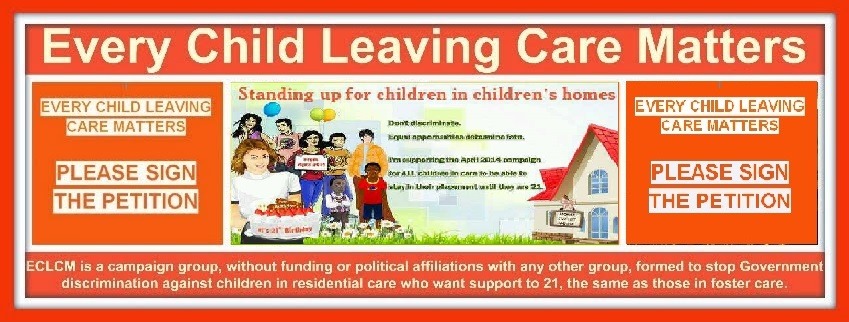This has been in very many senses a tumultuous week for ECLCM.
Only seven days ago we were delighted with the report of the All Party Select Education Committee recognising as it did that children leaving residential care were/are every bit as worthy of the support that ‘Staying Put’ as their peers leaving foster care. The additional recently publicised proposals that the placement of young people in care in unregulated and all too frequently awful Bed and Breakfast accommodation suggests that a considerable number of our elected representatives really do care about children in care.
Perhaps rather perversely, in some people’s eyes, we have also launched a ‘membership scheme’ for ECLCM. I feel certain that many people may have asked “Why?” It’s essentially because we recognised that our campaign varied and comparatively successful as it has been is rather one dimensional in terms of it’s public ‘cutting edge’. Membership also tends to suggest longevity and whilst all those who support the principles of our campaign would be delighted to find that our raison d'être was made redundant by a speedy change in legislation we appreciate that this is not likely. I hope and trust that we are wrong but our assessment is that despite the magnificent work of the Select Committee it seems extremely unlikely that our legislature will find the time to consider placing their recommendations before Parliament and putting it to a vote before the next General Election. So then, ECLCM needs to ensure that it is still around to work alongside many colleagues and other like-minded organisations between now and then. Thus far we have been very pleasantly surprised and gratified and the take up of membership and indeed the many offers of help that new members have made to us. Our biggest challenge as a group of people all of whom have day jobs is in trying to create an infrastructure that can coordinate all these generous offers. Please bare with us on that one.
This task has been rendered a little more challenging by the departure of Ian Dickson from the Campaign Core Group. Ian was a self-confessed grease monkey who laboured behind the scenes in ‘the engine room’ on behalf of the campaign – as indeed he still will in support of the common cause that brought our original group together. He will be missed. But that is the nature of ECLCM. Supporters, members and even opponents would perhaps welcome some clarification. ECLCM is not a group of people it is a Campaign. From our first days in December 2013 we have welcomed many supporters and some of those at the centre of organising things have left. This is another reason for opening membership. There is no-one who is currently actively involved in ECLCM who is not replaceable – we are entirely unimportant, merely for the time being the custodians of lead responsibility of driving forward our contribution to changing the current unjust treatment of residential care leavers. The current incumbents will give what they can while they can knowing that from within our membership there will be and are others to take up the cause as and when any one of us, for whatever, reason has to move on or step aside.
It’s Every Child Leaving Care (that) Matters not those doing their best to work on their behalf.
We as currently constituted or perhaps an entirely different leadership group will be continuing our work over the next nine months and if we haven’t succeeded by the we will be knocking on the door of the new occupants of the government benches in May next year.
